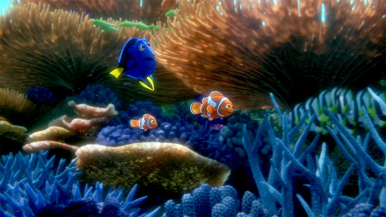Movie Review: Finding Dory
By Matthew Huntley
June 22, 2016
BoxOfficeProphets.com

You might say Finding Dory has the “disadvantage” of being a sequel, but then so was Toy Story 2. The difference is that Finding Dory essentially mirrors its predecessor, Finding Nemo, in terms of story and structure, and therefore it doesn't feel as fresh (whereas Toy Story 2 told a more unique story compared to the original). However, the filmmakers certainly introduce enough differences and new developments between “Nemo” and “Dory” to justify a sequel. So while it may not be a masterpiece, it's still a treasure.
Much of the film's appeal stems from the fact that Dory (voiced by Ellen DeGeneres) is so enormously likable and endearing. The blue tang fish, who suffers from short-term memory loss, is more than just cute and plucky; the screenwriters have shaped her to be well-rounded and complex, and we become fully immersed in the transformation she undergoes. Yes, her naïveté does make her funny, and her big, bulging eyes and soothing, gentle voice do make her adorable, especially in the flashbacks when we see Dory as a child, but the reason she captivates us is because the filmmakers get us to feel so strongly for the character and see the world from her point of view.
In fact, the film is pretty explicit about empathy. When the story opens, about a year has passed since Dory first met Marlin (Albert Brooks), the level-headed yet chronically anxious clown fish with whom she shared an adventure as they journeyed to find his son, Nemo (Hayden Rolence). Since then, Dory has become an unofficial member of the family because she has none of her own, at least not to her knowledge. One day, Dory accidentally fills in as an assistant school teacher, and this triggers memories from her own childhood. Suddenly, she's recalling her parents, Jenny (Diane Keaton) and Charlie (Eugene Levy), whom she had all but forgotten, and upon learning their last known whereabouts was California, Dory vows to trek across the ocean to find them, even though Marlin says she's being hasty and reckless. But Dory tells him that along with remembering her parents, she also remembers missing them, and she asks Marlin point blank, “Do you know what that's like?”
This question not only stops Martin in his tracks but also us, because we all know what that's like, and we also know that if we were in Dory's position, we'd probably do the same thing. The film's messages about family bonds and unconditional love are routine and obvious, yes, but they still hit home, and with these strong themes in place, all the conflicts, misadventures and shenanigans that will assuredly take place in later scenes carry more weight because we care such a great deal that Dory reunites with her parents.
How the rest of the story rolls out is, for the most part, in line with our expectations. Dory gets separated from Marlin and Nemo (hence the film's title) and we meet a host of (literally) colorful characters, including Destiny (Kaitlin Olson), a nearsighted whale shark whom Dory knew growing up; a beluga named Bailey (Ty Burrell), who's currently struggling with echoing; and a disgruntled octopus named Hank (Ed O'Neill). Dory finds them all at the Marine Life Institute, which looks vaguely familiar to her, and after being captured and tagged for transfer to the Cleveland Aquarium, she strikes a deal with Hank: if he gets her to the “open ocean” to find her parents, she'll give him her tag so he can live a comfortable life in the aquarium instead of the wild.
Marlin and Nemo, meanwhile, meet a pair of smart aleck, observant sea lions with gritty London accents named Fluke (Idris Elba) and Rudder (Dominic West). They call upon their bird friend Becky to transport Marlin and Nemo inside the park in hopes they'll find Dory, but they end up facing their own challenges.
All of this leads to a series of risks the characters must take to ensure they end up back together, and even though the narrative follows a classic “one hurdle after another” structure, the filmmakers execute each dilemma with such energy and enthusiasm they manage to come across as fresh.
Yet, the real heart and lasting effect of the movie comes during a critical scene in which Dory learns something about herself. She's back in the open ocean but she's lost and alone, and she repeats to herself, “What would Dory do?” Slowly, she practices mindful thinking and works her way through plant life and sand, directing and talking to herself out loud when all of a sudden...well I'll let you find out what happens. But the time and patience director Andrew Stanton devotes to this scene are the kind rarely seen in family pictures, which tend to operate on the principle that something big, busy and action-packed must always be happening so as not to lose viewers' attention. But moments like these grab our attention more. Seldom do computer-animated family movies slow down and simply allow the characters to reflect on their present situation. And it's not just the fact the movie allows this to happen that makes it great; it's that the story has built itself up toward this moment and it becomes a strong emotional payoff.
Finding Dory may not be entirely cutting edge, but it's wonderful and heartfelt just the same. True, there's a “safeness” and “easily digestible” factor to it, but it's also thoroughly entertaining, funny and moving. Its message is clear: friends and family are forever and they're always worth finding. We've heard this before from Pixar, and no doubt we'll hear it again, but perhaps the reason the studio is so successful and reputable is because its messages are those we all know to be true and that help guide us toward fulfillment. Maybe that's also why we usually walk out of a Pixar film so overwhelmingly happy.